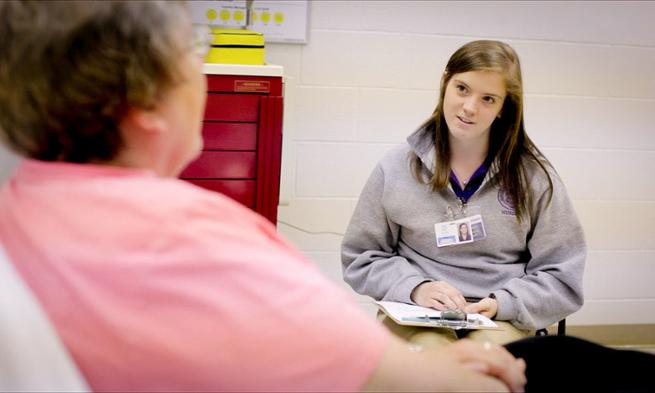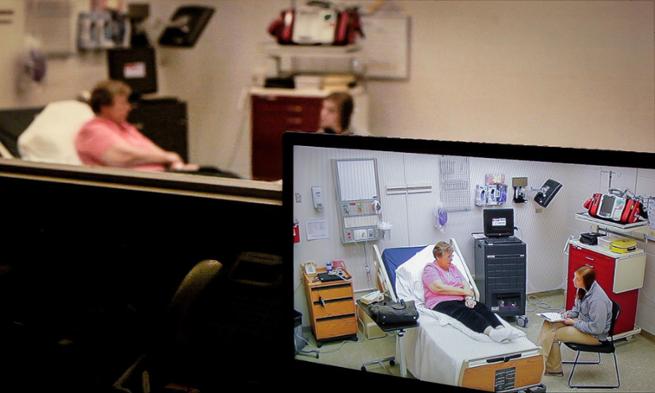Nursing simulation employs live patient
Health and Behavior
Getting direct feedback from an experienced professional develops therapeutic communication skills
By Jim Heffernan ('96), JMU Public Affairs
Helping nurses communicate
The patient in JMU's psychiatric nursing simulation this summer was no dummy.
Sue Thacker, a retired professor in the nursing program at Wytheville Community College and a member of Radford University's Clinical Simulation Center team, has been helping nursing students in Virginia gain experience with therapeutic communication techniques since 2009.
'The techniques the students learn in psych nursing will serve them well...Therapeutic communication is the foundation of all nursing.'
"I'm a professional patient," says Thacker, who works at her craft with the help of an actor. "For a retired person like me, it's perfect. There's very little stress to it. It's fun because I enjoy teaching, and I still get to teach at the end with the students. So I'm not out to pasture. I'm still useful."
Learning to avoid common pitfalls
JMU nursing instructors Diane Babral and Laureen Donovan secured a mini-grant from the department to bring Thacker to campus for a weeklong pilot project in May. During the simulation, Thacker played the role of a widow who lost her husband six months ago and was admitted to the hospital after her daughter became concerned about her not eating as well as changes in her demeanor and behavior.
"I see that your husband passed away. That must have been difficult for you. How are you feeling?" a student asks her.
"Lost," Thacker replies softly, staring off into space. "I just don't think there's anything out there that can help."
Over the next 20 minutes, the student tries to engage the patient in conversation and gain valuable information about her medications, her level of anxiety and depression, and her risk for suicide. The simulation ends with a 20-minute debriefing during which Thacker assesses the student's performance. The most common pitfalls involve students not paying attention to body language, not maintaining good eye contact and asking only yes-no questions.

No substitute for live patient
The use of a live patient, rather than mannequins, is a first for JMU nursing, but it is becoming more common in psychiatric simulations at nursing schools across the country, said Babral, who has held a variety of leadership positions in psychiatric-mental health settings including Western State Hospital in Staunton and the behavioral unit at Rockingham Memorial Hospital. "Research is showing that it has positive outcomes. The techniques the students learn in psych nursing will serve them well, not just here but in their careers. Therapeutic communication is the foundation of all nursing."
'You're getting direct feedback from an experienced professional...words [and] nonverbal [messages].'
Emily Jolly, a second-semester nursing student from Colonial Heights, Va., believes that working with a live patient is beneficial. "You're getting direct feedback from an experienced professional," she said. "With psych [nursing], I don't think the mannequin would have been as helpful. You would have just had words, you wouldn't have had nonverbal [messages]."
The two instructors will be sharing the results of the pilot with other medical professionals at the Virginia State Simulation Alliance in Lynchburg next month.
"What the students have gained, and how they light up during their debriefing with Sue, has really touched my heart," Babral said. "I knew that the training would be effective, but to hear their comments afterwards ... is really inspiring."
Learn more about the Madison Experience.
Explore opportunities in JMU's nursing programs.
